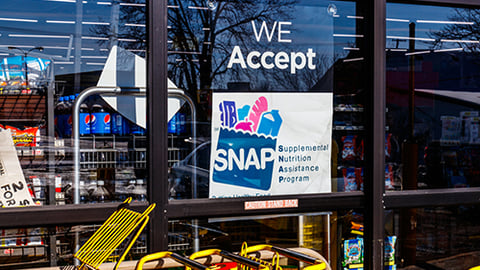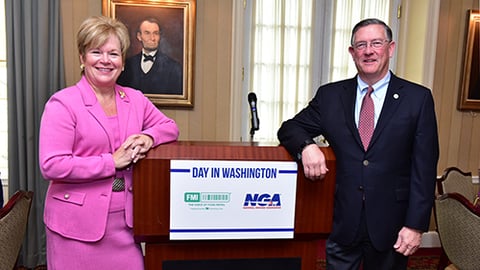Industry Hails Passage of Farm Bill
The passage of the Agriculture Improvement Act of 2018 – a.k.a. the Farm Bill – into law, was enthusiastically received by the nation’s grocers, with the trade organizations that represent them noting that the legislation includes “fantastic wins” for their members.
The legislation passed the House of Representatives 369-47 and the Senate with a vote of 87-13.
“The bill helps FMI members keep operation costs down and fosters innovation and efficiencies for the future of food retail and its customers,” noted Hannah Walker, senior director, technology and nutrition policy at Arlington, Va.-based Food Marketing Institute (FMI), adding that the legislation “leverages technology to better serve every customer shopping in our members’ grocery stores. It drives modernization in the electronic benefit transfer (EBT) systems while protecting retailers from unfair and predatory interchange and processing fees. FMI is also pleased the Farm Bill encourages creative proposals from retailers who would like to incentivize Supplemental Nutrition Assistance Program (SNAP) customers to buy more fresh fruits, vegetables, milk and whole grains, in addition to permanently authorizing the Food Insecurity Nutrition Incentive (FINI) program.”
Peter Larkin, president and CEO of the Arlington-based National Grocers Association (NGA), observed that the bill “strengthens the public-private partnership between the federal government and supermarket operators in the SNAP program. This legislation addresses important issues for independent grocers, including the protection against harmful processing fees and the increased investment in the FINI program. We were especially pleased to see the Farm Bill contain NGA-offered language that would direct significantly more FINI funding to independent supermarkets.”
However, Larkin pointed out that “a top priority to protect store-level SNAP sales data was not included in the Farm Bill. We will work closely with Congress and industry stakeholders to identify viable solutions to ensure that confidential information that could be used to give competitors an unfair advantage, particularly over many small and medium-size grocers, is protected from public disclosure.”
FMI’s ‘Highlights Reel’
FMI provided Progressive Grocer with a “highlights reel” of Farm Bill provisions benefiting food retailers:
- Online Supplemental Nutrition Assistance Program (SNAP): Authorizes online SNAP sales and removes the demonstration project deadline and the requirement for the report to Congress.
- Workforce Partnerships: Adopts the Senate language supported by FMI that authorizes workforce partnerships operated by private employers or nonprofits that would provide participants with at least 20 hours per week of training, work or experience.
- Modernization of Electronic Benefits Transfer (EBT) Regulations: Includes FMI-supported modified language directing the Secretary of Agriculture to periodically review and modify the EBT regulations and standards to reflect evolving security technology.
- EBT Processing Fee Ban: Includes FMI’s House bill language prohibiting state EBT processors and their subcontractors from charging retailers a fee for switching or routing a transaction.
- Mobile EBT Payments: Authorizes mobile EBT payments and includes language modified and supported by FMI directing the Secretary to authorize up to five state demonstration projects.
- SNAP Retailer Contracts with EBT Service Providers: Includes FMI-supported language that directs the Secretary to issue guidance for retailers on how to select EBT equipment and service providers, and allows the Secretary to request applicant retailers to provide certain records relating to EBT contractor and equipment purchasing.
- Retailer Incentive Projects: Includes modified language from the Senate bill that FMI supported directing the Secretary to issue guidance for retailers seeking waivers to offer incentives to SNAP customers to purchase eligible food items. Defines “eligible incentive foods” as a staple food that is identified for increased consumption, consistent with the most recent dietary recommendations, and, fruit, dairy and whole grains.
- Food Insecurity Nutrition Incentive (FINI) Grants: Permanently authorizes the FINI program, giving preference to retailers that are open more days of the year and longer hours, an FMI-championed provision. Provides mandatory funding of $45 million for fiscal year 2019, $48 million each for fiscal years 2020 and 2021, $53 million for fiscal year 2022, and $56 million for fiscal year 2023 and each fiscal year thereafter.
Independent Grocer Gains
For independent retailers in particular, the legislation offers some important gains, Christopher Jones, VP of government relations and counsel at NGA, told Progressive Grocer.
For instance, the bill creates a clearinghouse to offer technical assistance and provide best practices for participating retailers in the FINI program, providing small food retailers with often limited funds an invaluable resource they couldn’t otherwise afford. Similarly, the law’s extension of the prohibition on interchange fees to a permanent prohibition on state EBT processing fees also saves independent grocers much-needed dollars.
Another boon for operators of independent grocery stores was the bill’s rejection of a pilot project to test the Harvest Box proposal, which would have replaced about 40 percent of SNAP benefits with a government-run food delivery service. Many independent retailers objected to the proposal as “[failing] to appreciate the free-market, competitive efficiencies achieved through the successful public-private SNAP partnership.”
Jones also expressed excitement about the bill’s removal of reporting requirements to speed up the implementation of existing online SNAP pilots, as well as the authorization of a brand-new pilot leveraging mobile technology for the redemption of the program's benefits, as NGA members have expressed keen interest in both tests, and he believes that they represent the future of SNAP.
Among other industry organizations, a spokeswoman for the Arlington-based Grocery Manufacturers Association told PG that it was pleased to see the inclusion of food waste provisions and the preservation of programs that help families in need of nutrition assistance.
The Washington, D.C.-based United Fresh Produce Association also expressed its approval of the legislation, citing "major victories around increasing access to fresh produce in federal nutrition programs, breaking down trade barriers, focusing additional resources towards research priorities, and combating pest and disease challenges."
The Farm Bill now goes to President Donald Trump for his signature.






